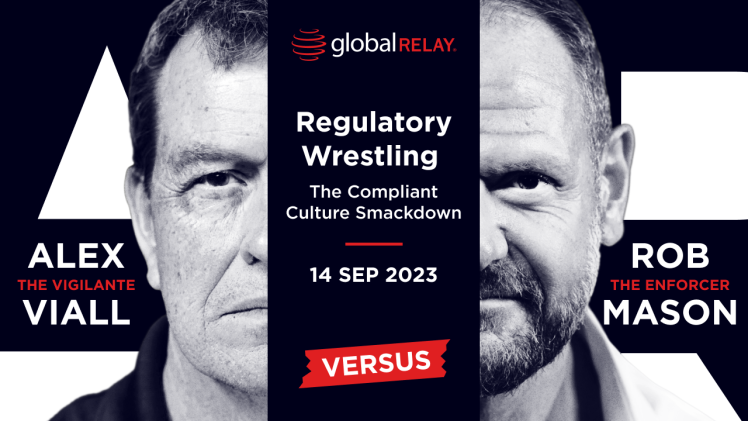The final bell might have rung, but the legacy of Regulatory Wrestling lives on! In our inaugural bout, our compliance champions engaged in a titanic tussle around conduct, culture, and compliance. They grappled with the big questions on whether it’s ‘tone from the top’ that matters, or if senior leaders need to ‘walk the talk’ and lead by example when it comes to conduct.
You can watch the full event on demand and pull up a ringside seat to re-live the rumble, but we’ve broken down the blow-by-blow from each round below.
Our compliance champions

Alex ‘The Vigilante’ Viall: Alex Viall is Chief Strategy Officer at Global Relay. He is a seasoned regulatory expert, responsible for developing and maintaining relationships with regulators and monitoring compliance best practice. He has previously worked as a supervisor for the FCA, as well as a director and co-founded of Complinet, and Head of Regulatory Intelligence for Behavox.

Rob ‘The Enforcer’ Mason: Rob is Director, Regulatory Intelligence at Global Relay. Previously he held a wide variety of roles, including as a trader, regulator, compliance officer, and surveillance technology vendor. He has worked in senior positions at UBS and Lloyds Banking Group, and spent five years at the FCA.
Round 1: How important are conduct and culture to regulators now?
Our first round explored why regulators are issuing stringent messaging around conduct and culture now, and whether wider societal shifts and a number of recent high-profile legal cases around culture are skewing views of how important it is to regulators, or if it is as important as it has ever been.
Rob Mason argued that every recent regulatory enforcement action is grounded in culture, and regulatory messaging, such as Therese Chambers’ “Do the right thing” speech and Emily Shepperd’s speech on the evolving regulatory expectations of culture, underpin this. Rob questioned whether regulators are more likely to prioritize scrutinizing firms that demonstrate poor conduct, in order to give investors more confidence in the strength of market governance, and to show there’s less tolerance for premeditated unacceptable behaviour.
Alex Viall emphasized that the shift toward culture and conduct based regulation depends on the regulatory environment and approach, and used the establishment of the Financial Conduct Authority (FCA) in 2013 as a watershed moment – for him, the clue is in the name of the FCA, as we have shifted towards a more ‘conduct’ focused environment. Recent comments from the Commodity Futures Trading Commission (CFTC) Chair Christie Goldsmith Romero show that regulators are exasperated with what seems to be a slide back towards the sort of conduct we saw during the 2008 financial crash, and both regulators and governments have made it clear that standards won’t be allowed to slip back to that level.
Round 2: Is policing culture the role of a regulator?
After both our compliance champions returned from their corners, they grappled with whether policing culture is the role of a regulator. How far does the regulatory remit reach in assessing culture, and does it extend to the conduct of an individual?
‘The Enforcer’ summarized that this is a question of “non-financial misconduct” that often relates to integrity, reputation, and dishonesty. He stated that there is a different level of regulatory oversight in financial services than in other industries, and as banking and finance are ‘trust based’ businesses, a lower level of tolerance for misconduct. The “fit and proper test” is used as a benchmark by regulators to assess individual conduct, and we’ve seen examples of it being applied by regulators to misconduct like Jonathan Paul Burrows’ rail fare avoidance. Rob also had questions around whether firms will deal with integrity based issues if left to their own devices, and drew parallels with SEC Commissioner Hester Peirce’s reaction to the Ernst & Young ethics exam scandal where she believed it an issue that should have been dealt with ‘in house’.
Alex views this as a divisive topic, with many in the industry questioning whether regulators are overreaching their real purpose – to protect consumers and make sure markets and finance systems operate in a stable way. Compliance professionals have seen their role change, and can find themselves policing people’s emails and communications to ensure they are behaving compliantly – an added challenge on top of their already difficult responsibilities. His concern is that this ‘regulatory creep’ might be dissuading people from pursuing careers in finance, as they might feel excessively monitored or over-regulated. Creating an environment that the talent of tomorrow might not want to work in is bad for the industry.
Round 3: Should conduct in your personal life matter to your professional life?
After a quick towelling off, our conduct and culture competitors tussled with the topic of whether conduct in one’s personal life should matter to their professional life. With regulators expecting senior managers to set the ‘tone at the top’, and leaders being found liable for lapses in recent enforcement actions, are managers increasingly being held responsible for the culture of an organizations?
For Rob, recent SEC enforcement actions against senior leaders – including members of the compliance team that “should have known better” – highlight how regulators will take action against those who should be leading by example. Rob’s view is that it isn’t ‘tone at the top’, but actions and examples that are needed from leaders. Examples including Morgan Stanley’s system of internal fines for communications misconduct, and the FCA’s Senior Managers Certification Regime (SMCR) illustrate how leaders need to “live the values” they set, and abide by consistent consequences when things go wrong. For Rob, banking and finance need to be seen to be run by honest, respectable people – including outside the nine-to-five.
‘The Vigilante’ hit back by discussing how senior managers are well compensated for the risks in their position, and the higher level of scrutiny around their conduct. Examples including Alison Rose’s ousting from NatWest and the Credit Suisse ‘Spygate’ scandal are clear evidence that senior leaders can’t conduct themselves poorly then expect their employees to meet a higher standard. Alex believes there is a lot more liability now, especially individual liability, and that there is a case to be made that they should be compensated for that risk. ‘Tone at the top’ is paramount, and standards and policies to maintain it must be set – with senior managers having to abide by them.




